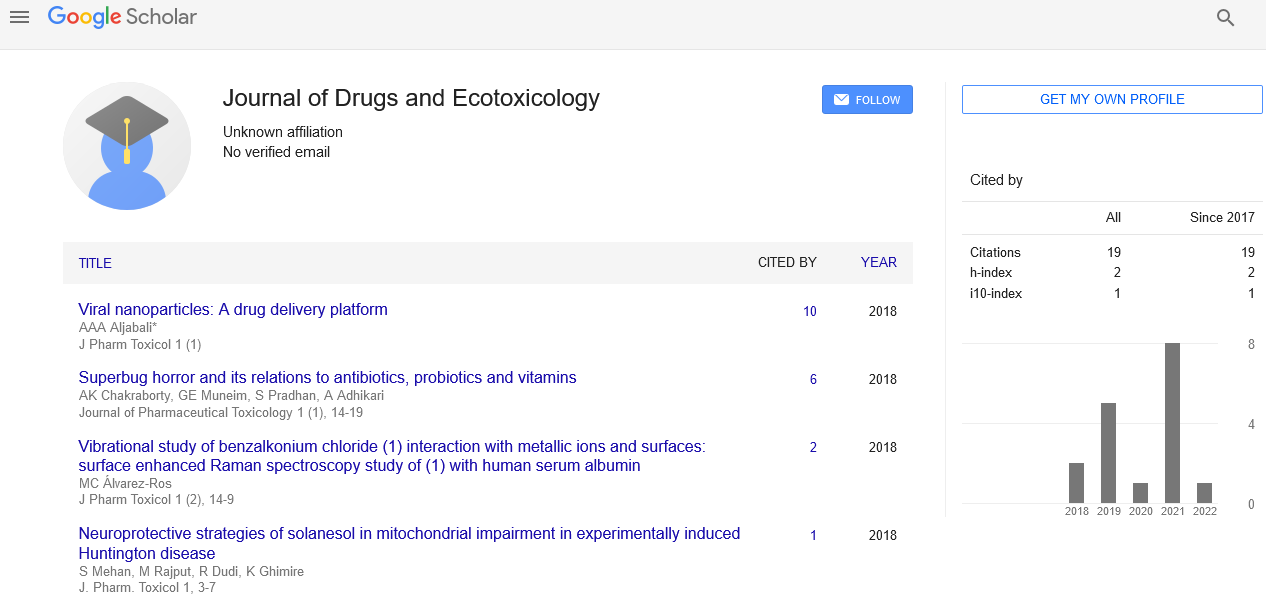Drug discovery and screening on pharmacogenomics
Received: 09-Jan-2022, Manuscript No. puljde-22-4568; Editor assigned: 11-Jan-2022, Pre QC No. puljde-22-4568 (PQ); Accepted Date: Jan 20, 2022; Reviewed: 20-Jan-2022 QC No. puljde-22-4568 (Q); Revised: 21-Jan-2022, Manuscript No. puljde-22-4568 (R); Published: 25-Jan-2022, DOI: 10.37532.puljde.22.5.1.5
Citation: Johanna Simin. Drug discovery and screening on pharmacogenomics. J Drug Eco. 2022; 5(1):1-2.
This open-access article is distributed under the terms of the Creative Commons Attribution Non-Commercial License (CC BY-NC) (http://creativecommons.org/licenses/by-nc/4.0/), which permits reuse, distribution and reproduction of the article, provided that the original work is properly cited and the reuse is restricted to noncommercial purposes. For commercial reuse, contact reprints@pulsus.com
Introduction
Medication design is one of the most crucial parts of the drug development process. The binding energy of the lead molecule to the target, as well as its thermodynamic properties, are predicted through drug screening. Molecular mechanics and molecular dynamics are the most commonly used approaches for forecasting model conformation changes. This lecture will cover the practical challenges of drug targeting and design, as well as solutions for overcoming them. Pharmacokinetic effect is determined by the amount of medication present at the target area. Recent advances in analytical and quantitative techniques have often resulted in non-invasive studies of drug pharmacokinetics at the site of action in order to gain a better understanding of pharmacokinetic properties. Pharmacodynamics is affected by receptor binding and sensitivity, post receptor effects, chemical interactions, physiologic changes caused by genetic mutations, diseases, ageing, or the impact of other drugs. Pharmacodynamics and pharmacokinetics describe the effects of drugs on the host body.
The drug's effect and response vary from person to person due to the fact that everyone's DNA is unique. Pharmacogenomics is a branch of genetics that studies a person's genetic reaction to a drug and gene-drug interactions in the body. Pharmacogenomics is the cornerstone of personalized medicine, a relatively new concept that is expected to gain traction in the next years.
Clinical pharmacology, cardiovascular pharmacology, behavioral pharmacology, neuropsycho pharmacology, pharmacogenetics, and Pharmacoeconomics are only a few of the pharmacology's many sub-specialties. Toxicology studies the negative consequences of pharmaceuticals and chemical substances, as well as treatment options, whereas pharmacology studies the positive effects of drugs. This session tackles critical challenges in drug delivery systems, including poorly soluble drug component distribution and bioavailability, as well as drug molecules' inaccessibility to the target region. Pediatric and geriatric medicine distribution, as well as biologic (peptides, proteins, and DNA-based therapies) drug delivery, are all key issues. New technologies and approaches are being developed to address medicine delivery issues. Some of the choices include smart drug delivery systems, sustained release drug delivery, nanoparticle-based drug delivery systems, medical devices for drug delivery, biologic drug delivery systems, and dosage form printing technology. Drug Delivery Systems (DDS) are a collection of cutting-edge approaches that bring together pharmaceutics, bio conjugate chemistry, molecular biology, pharmacology, polymer sciences, nanotechnology, and electronics in a multidisciplinary approach. Effective disease treatment requires a successful drug delivery system. The oral medication delivery system and the parental drug delivery system are the most commonly used drug delivery systems. This session will go over alternative drug delivery mechanisms include pulmonary drug delivery, transdermal drug delivery, pro-drug delivery, ocular drug delivery, and Trans mucosal drug delivery.
The pharmaceutical industry comprises of companies that are engaged in research, development, manufacture and distribution drugs for human or veterinary use. The primary function of the research-based pharmaceutical corporations is to create value by discovering and producing effective medicines, vaccines and services that improve patients’ well-being, and can be sold in markets at a profit. As well as increasing shareholder value, this contributes significantly to the quality and protection of life and helps make the world a better place. In the past 60 years, innovation and technology have driven huge improvements in global health.





